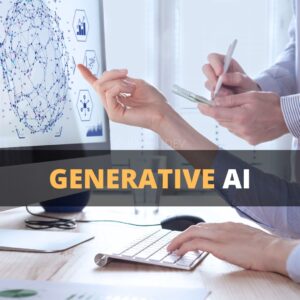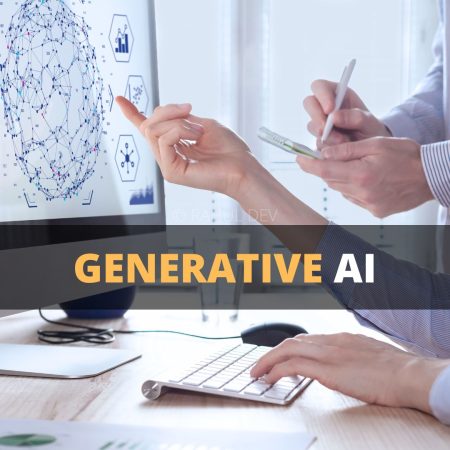Generative Artificial Intelligence or Generative AI represents a specific type of artificial intelligence that can generate large volumes of data. Due the rapidly evolving space of AI, Generative AI is presently one of the fastest growing innovations across the globe. The Generative AI technology landscape is expanding at a fast pace including an exponential increase in multiple patent applications that disclose the corresponding innovations. This is made possible by filing of Generative AI patents as international patents under the Patent Cooperation Treaty covering Generative AI business models by Generative AI startups that are adding immense value to the overall AI technology landscape. These patents mostly include system and method patent claims as drafted for digital innovations covering software patents.

In the realm of deep learning, one of the key challenges is the scarcity of high-quality labeled data for training neural networks. This problem is particularly pronounced in situations where there are limited training sets of images labeled for specific characteristics, such as facial expressions or identifying features. A range of strategies have been developed to address this issue. One approach involves the use of one neural network, termed the ‘teacher’, to train another, the ‘student’, to replicate its outputs. A related concept has been applied in neural cryptography, which employs a neural key exchange mechanism to secure communication, demonstrating potential resilience against cryptographic attacks from quantum computers.
Another significant development in the field is Generative Adversarial Networks (GANs), as detailed by Goodfellow et al. In GANs, two networks compete in a manner reminiscent of counterfeiters versus police: the first network (counterfeiter) generates an image that it attempts to pass off as legitimate to the second network (police), which tries to detect the counterfeit. This competitive process aims to produce images from the counterfeiter network that are indistinguishable from real images.
In addition, there are techniques like augmentation that supplement the training dataset with similar data generated from the existing information. This process, which can involve the application of rotation, translation, and blurring among other modifications to existing labeled images, serves as a regularization strategy, reducing the likelihood of overfitting. However, these approaches have limitations and are not without challenges. For instance, the choice of augmentation strategy can be critical, often proving more important than the type of network architecture used. Sophisticated types of augmentation, such as selectively blending images or adding directional lighting, necessitate expert knowledge, and there’s no universal method to ascertain in advance if a specific augmentation strategy will enhance the training of a target neural network. In conclusion, despite the challenges, advancements like GANs and augmentation strategies are pioneering the way to optimize the training of neural networks. The innovative application of these methods is paving the way for improved deep learning outcomes, with the potential for reduced overfitting and higher accuracy, as disclosed in US 10915817 granted to FotoNation Limited by the USPTO.
In the rapidly evolving technological landscape, the role of artificial intelligence (AI) in generating inventions poses novel challenges to the US patent system. Recently, the US Supreme Court chose not to hear a landmark case, Thaler vs. Vidal, effectively reinforcing the stance that only “natural persons” are entitled to patents. The ruling limits the extension of patent rights to AI despite its increasing role in generating creative solutions in significant economic areas.
However, this development does not alleviate growing concerns about AI’s potential to disrupt other facets of intellectual property law. The burgeoning rise of generative AI, exemplified by technologies such as OpenAI’s ChatGPT, has spurred apprehension about AI’s ability to stretch current interpretations of patent law, potentially sparking a surge in litigation.
Despite these concerns, AI applications, as they stand, do not pose a direct threat to the existing patent system, as they act as tools aiding human ideation rather than operating autonomously. Nevertheless, the prospect of AI independently generating inventions exposes the current legal system’s inadequacies in managing such scenarios.
Ahead of such developments, the legal community is already grappling with the potential onslaught of patent applications generated by AI systems. Meanwhile, similar patent cases involving AI inventions have been dismissed in other jurisdictions including the EU, UK, Germany, and Canada. As AI technologies grow more sophisticated, it becomes increasingly ambiguous to assign direct responsibility for AI-powered breakthroughs in patented research. Consequently, there is a call for revising patent laws to reflect new ways of working with AI, including potentially requiring greater disclosure about the role of AI in devising patent applications. However, these propositions also trigger concerns about adding burdens on inventors and sparking new debates not yet considered under current patent laws.
Generative AI, as an AI technology is creating shockwaves across various industries, including finance, healthcare, and even the arts. Generative AI is comparable to a skilled artist who creates exceptional works of art from scratch, rather than simply modifying existing data. The implementation of generative AI is revolutionizing the manner in which we derive insights from financial data. It’s like having a highly skilled analyst who tirelessly sifts through vast amounts of data to distil intricate financial trends.
Consider the example of KPMG, a company that has successfully leveraged the potential of generative AI to optimize their financial reporting and compliance processes, thereby enhancing their ability to provide accurate and tailored recommendations to their esteemed clients. At Morgan Stanley, they have implemented OpenAI-powered chatbots to provide support to their esteemed financial advisors. Also, Bloomberg has successfully introduced its finance fine-tuned generative model, BloombergGPT, which has demonstrated exceptional performance in tasks such as sentiment analysis and news classification, surpassing the benchmarks.
The unparalleled efficiency of generative AI is truly charming. Imagine being in a vast library, with an endless sea of books, searching for specific information dispersed throughout the collection. Is that not a challenging endeavour? Just envision possessing a revolutionary lens that can instantaneously scan numerous books and precisely identify your requirements. The efficiency that generative AI brings to big data is truly remarkable. This cutting-edge technology has the capability to efficiently process, summarize, and extract valuable insights from vast amounts of financial documents, including annual reports, financial statements, and earnings calls. This enables the users to make informed decisions and conduct analysis in a more streamlined manner.
As companies continue to integrate AI into financial decision-making, it is imperative that the AI startups tread the fine line between innovation and regulation with utmost caution. The top priority is to ensure that these powerful tools are utilized ethically and responsibly. In summary, the implementation of generative AI is not only transforming financial analysis and growth projections, but also reshaping the fundamental structure of the finance industry. Generative AI is revolutionizing the way companies make sense of big data and predict business growth. Generative AI models have the capability to be trained on vast financial datasets, enabling them to provide accurate and comprehensive responses to a diverse range of financial inquiries. These inquiries may include topics such as accounting principles, financial ratios, stock analysis, and regulatory compliance. Moving forward, we can anticipate witnessing even more remarkable applications of generative AI in finance. These applications will range from streamlining mundane tasks to offering profound insights and delivering precise forecasts. As we move towards a more data-driven world, it is clear that generative AI will play a crucial role in shaping the future of finance.

As a business coach and thought leader, I cannot emphasize enough the importance of innovation, new software patents, mobile apps, and patents for tech companies, startups, and entrepreneurs. The world is rapidly evolving, and staying ahead of the curve is vital for success. Embracing technological advancements such as blockchain and AI can unlock unprecedented opportunities, streamline operations, and propel businesses into the future with competitive valuation via intangible assets.
Click Here for AI Startup Valuation Guide.
For instance, blockchain technology can revolutionize supply chain management and secure data sharing wherein innovative business models are explained to the audience via technical whitepapers, while AI can automate and optimize decision-making processes. Mobile apps are no longer just a luxury; they have become essential tools for engaging customers and offering personalized experiences. Furthermore, securing digital innovation patents is crucial for protecting intellectual property, fostering innovation, and maintaining a competitive edge. By investing in these areas, businesses can position themselves as industry pioneers and pave the way for a prosperous future after thoroughly conducting the due diligence and reviewing the legal opinion letters, which in case of digital assets can assist in determining the tokens as utility assets or coins as utility tokens before listing the assets at an exchange.
Our team of advanced patent attorneys assists clients with patent searches, drafting patent applications, and patent (intellectual property) agreements, including licensing and non-disclosure agreements. Advocate Rahul Dev is a Patent Attorney & International Business Lawyer practicing Technology, Intellectual Property & Corporate Laws. He is reachable at rd (at) patentbusinesslawyer (dot) com & @rdpatentlawyer on Twitter.
Quoted in and contributed to 50+ national & international publications (Bloomberg, FirstPost, SwissInfo, Outlook Money, Yahoo News, Times of India, Economic Times, Business Standard, Quartz, Global Legal Post, International Bar Association, LawAsia, BioSpectrum Asia, Digital News Asia, e27, Leaders Speak, Entrepreneur India, VCCircle, AutoTech).
Regularly invited to speak at international & national platforms (conferences, TV channels, seminars, corporate trainings, government workshops) on technology, patents, business strategy, legal developments, leadership & management.
Working closely with patent attorneys along with international law firms with significant experience with lawyers in Asia Pacific providing services to clients in US and Europe. Flagship services include international patent and trademark filings, patent services in India and global patent consulting services.
Global Blockchain Lawyers (www.GlobalBlockchainLawyers.com) is a digital platform to discuss legal issues, latest technology and legal developments, and applicable laws in the dynamic field of Digital Currency, Blockchain, Bitcoin, Cryptocurrency and raising capital through the sale of tokens or coins (ICO or Initial Coin Offerings).
Blockchain ecosystem in India is evolving at a rapid pace and a proactive legal approach is required by blockchain lawyers in India to understand the complex nature of applicable laws and regulations.